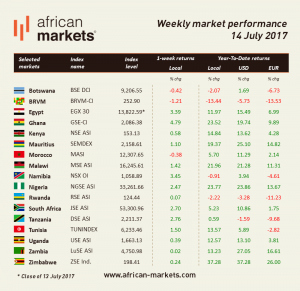This week witnessed a more bullish stance on African markets as most indices under our watch closed on positive territories.
According to a survey, South Africa’s consumer confidence slipped deeper into negative ground in the second quarter, stressing households’ concerns about the weak prospects of the economy.
South Africa recently slid into recession and food prices remain very high and which is expected to continue to affect the real purchasing power of consumers, especially for low income households.
In the meantime, Finance Minister Malusi Gigaba laid out a 14-point program on Thursday to force the economy out of recession that included the sale of non-core assets and partial privatization of state-owned firms. A shift from the usual ANC philosophy which used not to be pro privatisation.
Gigaba announced the government would also reduce the issuance of guarantees to state companies, especially those extended for operational purposes. This is in line with what ratings agencies have identified as necessary actions to turnaround the economy. The JSE rose 2.7%.
Zambia has been under uncommon tension since the arrest in April of opposition leader Hakainde Hichilema on treason charges. This week the parliament prolonged Lungu’s emergency powers by three months in an attempt to contain a series of arson attacks on market places and court-houses. Zambia’s government stated however that emergency powers could be revoked within three months. LuSE rose 0.02%.
Zimbabwe’s tax agency reported that the country collected $1.8 bn in taxes during the first six months of this year. This is 8% above Zimbabwe’s target. Consequently, the full-year forecast has been revised up on better economic growth prospects. Company tax collections surpassed expectations by 36% due to higher profitability in the banking sector and improvements in tax monitoring.
In addition, mining royalties were 23% above target due to strengthening global commodity prices. Gold, platinum and nickel represent more than 50% of Zimbabwe’s export earnings. Zimbabwe Revenue Authority (ZIMRA) has updated its full-year target to $3.4 bn due to higher than expected economic growth of 3.7% this year. The ZSEincreased by 0.24%.
In a statement, Nigerian oil minister declared Nigeria supports OPEC’s efforts to stabilize oil prices, but it wants to wait before deciding whether join the cartel’s cuts in oil production. The minister said he hoped they could see how predictable the production return has been in the next two to three months before feeling more comfortable in making cuts.
Nigeria’s current output is around 1.7 mn barrels a day and its benchmark level to join the OPEC cuts is production of 1.8 mn barrels of crude a day. OPEC announced this week that its oil production increased in June and pointed to a market surplus in 2018 despite the OPEC-led output cut. The NGSE rose 2.47%.
Africanmarkets.com



